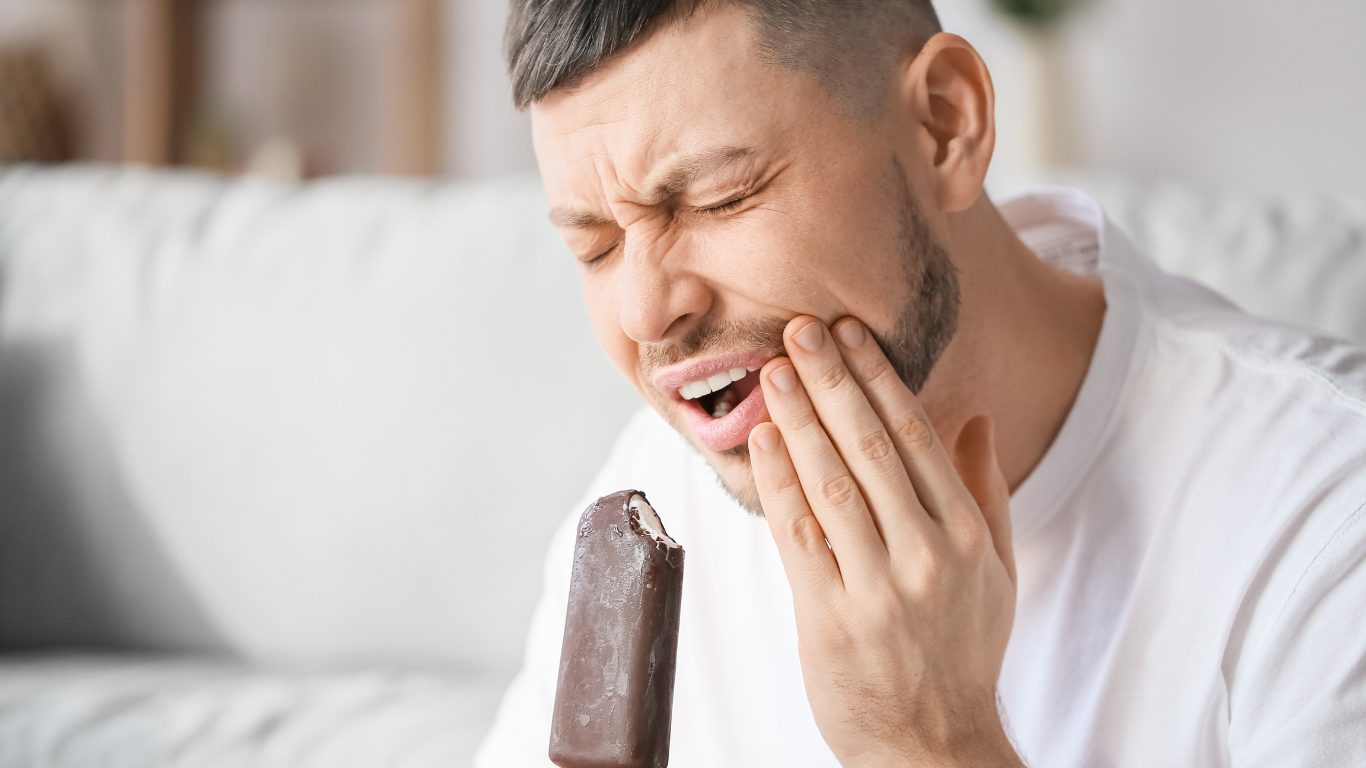
Who is a Good Candidate for Myofunctional Therapy
November 21, 2023
Can Bad Oral Hygiene Cause Health Problems?
December 18, 2023Key Takeaways:
Common Triggers of Tooth Sensitivity:
Tooth sensitivity often occurs due to enamel erosion, exposing the underlying dentin. This can happen from consuming acidic foods, using abrasive toothpaste, or over-brushing.
Gum Health and Sensitivity:
Receding gums, often caused by gum disease or aggressive brushing, can expose tooth roots, making teeth more sensitive to hot or cold stimuli.
Preventive Measures:
Proper oral hygiene, using desensitizing toothpaste, and addressing any underlying dental issues with a dentist can significantly reduce or prevent sensitivity.
If you sometimes feel a jolt of sensitivity when you have a hot or cold drink, you may wonder, “What causes tooth sensitivity?”
Basically, if your teeth feel sensitive to temperature or other things like sweet flavors, pay attention. It is warning you that the inner layer of the tooth is exposed. That could be because the enamel is eroded, receding gums, a crack in the tooth, or even a cavity. All of those conditions need attention and care.
While this article covers some of the causes of tooth sensitivity, it is not a substitute for professional dental care. Pain is a warning sign of a problem. Pain is a warning sign of a problem. We urge you to see a dentist to identify the source of your dental pain or sensitivity.
By understanding some of the possible causes of tooth sensitivity, you can prevent it from happening or use the information to seek dental care. It starts by understanding your tooth’s anatomy.
Understanding Your Tooth’s Anatomy
Your tooth has layers; sensitivity and pain happen if the inner layers become exposed. The outermost layer is made from protective enamel. According to BBC Science Focus, Enamel is the most complex surface in your body, but it isn’t indestructible.
Enamel can be damaged or eroded by:
- Wear and tear over time, which happens faster from grinding your teeth
- Trauma from opening a bottle or being used as tools
- From ongoing exposure to acidic foods and drinks like coffee, soda, tomato sauce, or wine
- From poor dental hygiene, which allows acids to accumulate.
- From the overuse of tooth whitening products to DIY tooth whitening techniques found on TikTok.
- From overly vigorous brushing or using hard-bristled toothbrushes.
When the enamel becomes eroded or thin, it exposes the dentin inside. Dentin is a hard tissue layer beneath the outer enamel. It’s softer than enamel but harder than bone. Dentin provides support to the enamel and helps protect the inner pulp.
Dentin has tiny holes that allow temperature to reach the tooth’s sensitive inner layer. The pulp layer contains the soft tissue found inside the teeth. It’s where the sensitive nerves and blood vessels are located. Sensitivity and pain indicate the inner layers are exposed for some reason.
Tooth Sensitivity Triggers
Jolts of pain and sensitivity likely have specific triggers.
- These can be changes in temperature, like a response to hot or cold temperatures
- It can be chemical, like in the case of tooth whitening or bleaching products
- It can be a response to something physical, like pressure from biting down hard or vigorously brushing the tooth
Pay attention to what seems to trigger your sensitivity and whether it is generalized or focused on a specific tooth (or area with a few teeth). Be sure to talk with your dentist about the triggers and the situations where you notice pain and sensitivity.
Relieving the Discomfort of Tooth Sensitivity
Ways to deal with sensitivity from wear and tear with age:
- See your dentist to determine the reason for the sensitivity.
- Your dentist may recommend a desensitizing toothpaste for relief.
- Brush your teeth gently using a soft-bristled toothbrush to avoid further damage from vigorous brushing. Use fluoride toothpaste and floss daily.
- Minimize acidic foods and beverages that can cause additional tooth enamel erosion.
- Avoid grinding your teeth if you wear a mouthguard when you sleep.
- Your dentist may recommend bonding, desensitizing treatment or even fluoride varnish to protect the dentin.
If you have new or intensifying sensitivity, contact your dentist to schedule an appointment. Sometimes, tooth sensitivity results from a cavity, exposed root, or even damage to the tooth like a crack. The best treatment depends on the nature of the damage.
For example, a filling may end your sensitivity if it is a cavity. If it is a crack, you may need a crown, bonding, or a veneer. You don’t want to ignore the damage since this kind of damage doesn’t get better on its own. If it progresses, you may need a root canal or even, eventually, a tooth extraction.
Sometimes, the sensitivity comes from the exposed root, possibly from receding gums. This is often due to gum disease. It’s best prevented by flossing, brushing consistently, and seeing your dentist regularly for a professional cleaning. In mild cases, that may provide your gums release so they stop receding further. Other times, you may need treatment like a gum graft to provide relief.
In other words, if your sensitivity is due to an oral health issue like a cavity, tooth damage, or gum disease, please see your dentist for an exam to determine the cause and for treatment.
Temporary Tooth Sensitivity
Sometimes, tooth sensitivity is temporary following a dental treatment or cosmetic tooth whitening procedure. Some examples of treatments that may cause this include:
- Routine professional teeth cleanings
- Restorations
- Tooth whitening
- Replacement crowns
- Root planing or scaling
Talk with your dentist about how long the sensitivity might last and what steps are recommended for relief and comfort. Knowing what to expect puts you in a solid position to seek further care if something goes wrong or doesn’t meet your expectations.
A Note About Tooth Whitening Treatments and Sensitivity
As cosmetic dentists, we should note that whitening products are among the common causes of tooth sensitivity. Sometimes, it is temporary, while other times, it results from eroded tooth enamel or damage, depending on the tooth whitening method.
This is why we don’t recommend DIY at-home whitening like some of the “natural” techniques that went viral on social media. Any whitening treatment must be cleared by your dentist, who will assess whether your tooth enamel is strong enough. When used correctly on healthy teeth, the increased sensitivity should be temporary and go away once you stop using the product. This includes tooth whitening toothpastes, which your dentist may have approved.
If you experience sensitivity after using an over-the-counter or DIY whitening technique, stop using the product to see if the sensitivity resolves. Make an appointment with your dentist to determine whether it is due to any damage.
Schedule an Appointment With a Dentist
Please see your dentist if you have unexplained, new, or intensifying tooth sensitivity. Identifying the cause is essential to find the proper treatment to prevent further damage and pain.
If you live in or near Charlotte, NC, then we hope you will consider Southview Dentistry if you need a dentist. We proudly serve the community by offering preventative, general, and cosmetic dentistry.




